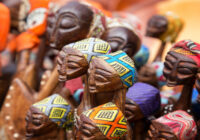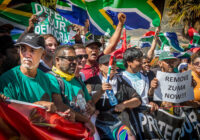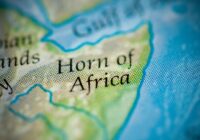As with many other aspects of political and economic life on the continent, there is a complexity to African civil society and grassroots activism that escapes the international eye.
Nigerian civil society groups are watching warily as long-running protests in neighboring Niger build in intensity, with some calling on Nigeria’s President Muhammadu Buhari to intervene and urge the Nigerien government to halt the “harassment and detention of civil society leaders” in the country. The protests mostly center around high cost of living, but authorities in Niger have responded to parallel demands for civil liberties and political freedom in the way African governments often do: with a crackdown. Between March and April, the Nigerien government arrested around 26 people in anti-government related protests, with most coming from the ranks of civil society. Some are now suing the authorities for their “arbitrary detention.”
The events in Niger offer yet another reminder of the risks African activists face on a daily basis when standing up to the continent’s powerful. But they also offer an opportunity to consider the diversity of activist movements in Africa and the fact that not all of them are necessarily driven by altruism. Many grassroots figures take on authoritarian regimes and powerful business interests to advance causes like higher standards of living, improved public health, safer environments and increased transparency. More than a few others, however, use the tools of civic engagement to target vulnerable minority groups or undermine important reforms.
Heavy Price
That political activism comes with a heavy price tag seems to be a ubiquitous issue across the continent. In the troubled East African nation of Burundi, activist Germain Rukuki recently bagged 32 years in prison for “rebellion and threatening state security.” As Human Rights Watch has pointed out, Rukuki is in fact a human rights defender whose crime was to investigate the violence surrounding President Pierre Nkurunziza’s move to run for (and ultimately win) a third consecutive term in violation of the two-term limit set by Burundi’s constitution.
The capacity for repression is not limited to governments. In Nigeria, anti-smoking activist Akinbode Oluwafemi, of Environmental Rights Action/Friends of the Earth, has provoked the anger of tobacco industry players with his campaign against its attempts to influence government policy. The backlash against Oluwafemi started with death threats, but then escalated to an attack on his home by armed men who murdered both his brother-in-law and his guard. Oluwafemi was one of several activists to share their stories during the World Conference on Tobacco or Health, which took place in Cape Town in March this year, and highlighted the dangers faced by those who stand up to the powerful Big Tobacco.
Arrests, jail sentences, and threats of violence are not the only tools corrupt or autocratic African leaders have at their disposal. Even though civil society groups operate with greater freedom in much of southern Africa, and even if activists have achieved remarkable success in fighting graft, governments and business interests still have considerable resources at their disposal to counteract grassroots pressure.
Former South African President Jacob Zuma was forced out by an impending no-confidence vote earlier this year, but prior to that, he managed to cling on to power for years despite constant corruption scandals and mass protests in the streets. Zuma’s approach of shrugging off public pressure while leveraging influence over institutions like state prosecutors and the police kept him in office. His downfall only came when his rel=”noopener”>African National Congress party, fearful of electoral backlash, finally abandoned him.
It was an ignoble end for a man who was himself a famous activist working alongside Nelson Mandela against apartheid, but Zuma is a living example of yesterday’s heroes transforming into today’s villains. South Africa is desperately short of activists willing to pick up Mandela’s mantle today. Instead of promoting racial and social coexistence, the courts have had to restrain the Black First Land First movement from intimidating journalists and editors in pursuit of their radical goals of land expropriation from white South Africans.
As with state oppression, grassroots attacks on minorities seem to be a continental trend. South Africa’s fault lines are racial, but in other countries, some faith-based and religious organizations pressure governments and co-opt other civic formations to the detriment of other members of society. Projects to promote good family health practices and reduce intolerance against people on the basis of sexual orientation have been stymied by an international alliance of African and Western religious activists. Ironically, these campaigners frame initiatives like access to health care and respect for minorities as “colonial” ventures, despite their own deep connections with the Christian right in places like the United States.
Local Complexity
African activists have adopted more than just religious fervor from their Western counterparts. As in the United States, Africa has a certain class of activist whose activities ultimately serve business interests more than the public good. These include Kenya’s serial filer of lawsuits, Okiya Omtatah, who constantly challenges new government regulations by filing lawsuits whose ultimate beneficiaries are the sugar industry, the alcohol industry and other pressure groups.
One such case, which recently threatened to upend Kenyan tax policy, focused on excise taxes for bottled drinks, which, Omtatah claimed, would burden manufacturers and consumers with higher costs. While one court initially ruled that the government’s implementation of the Excise Goods Management System was unconstitutional, Kenya’s Court of Appeal has allowed it to go ahead. The matter has serious implications for the country’s fiscal health and, by raising prices on sugary drinks, it has important benefits for public health as well.
As with many other aspects of political and economic life on the continent, there is a complexity to African civil society and grassroots activism that escapes the international eye. Civic engagement in Africa has much in common with the West, although there is ultimately one key difference that works to Africa’s detriment. Civil society groups in most Western countries can articulate their views in an environment of respect for the physical safety of individuals, tolerance for opposing viewpoints and identities, and commitments to transparency. Their counterparts in even the freest of African countries cannot say the same.
The views expressed in this article are the author’s own and do not necessarily reflect Fair Observer’s editorial policy.
Photo Credit: Aqua Images / Shutterstock.com
Support Fair Observer
We rely on your support for our independence, diversity and quality.
For more than 10 years, Fair Observer has been free, fair and independent. No billionaire owns us, no advertisers control us. We are a reader-supported nonprofit. Unlike many other publications, we keep our content free for readers regardless of where they live or whether they can afford to pay. We have no paywalls and no ads.
In the post-truth era of fake news, echo chambers and filter bubbles, we publish a plurality of perspectives from around the world. Anyone can publish with us, but everyone goes through a rigorous editorial process. So, you get fact-checked, well-reasoned content instead of noise.
We publish 3,000+ voices from 90+ countries. We also conduct education and training programs
on subjects ranging from digital media and journalism to writing and critical thinking. This
doesn’t come cheap. Servers, editors, trainers and web developers cost
money.
Please consider supporting us on a regular basis as a recurring donor or a
sustaining member.
Will you support FO’s journalism?
We rely on your support for our independence, diversity and quality.








Commenting Guidelines
Please read our commenting guidelines before commenting.
1. Be Respectful: Please be polite to the author. Avoid hostility. The whole point of Fair Observer is openness to different perspectives from perspectives from around the world.
2. Comment Thoughtfully: Please be relevant and constructive. We do not allow personal attacks, disinformation or trolling. We will remove hate speech or incitement.
3. Contribute Usefully: Add something of value — a point of view, an argument, a personal experience or a relevant link if you are citing statistics and key facts.
Please agree to the guidelines before proceeding.